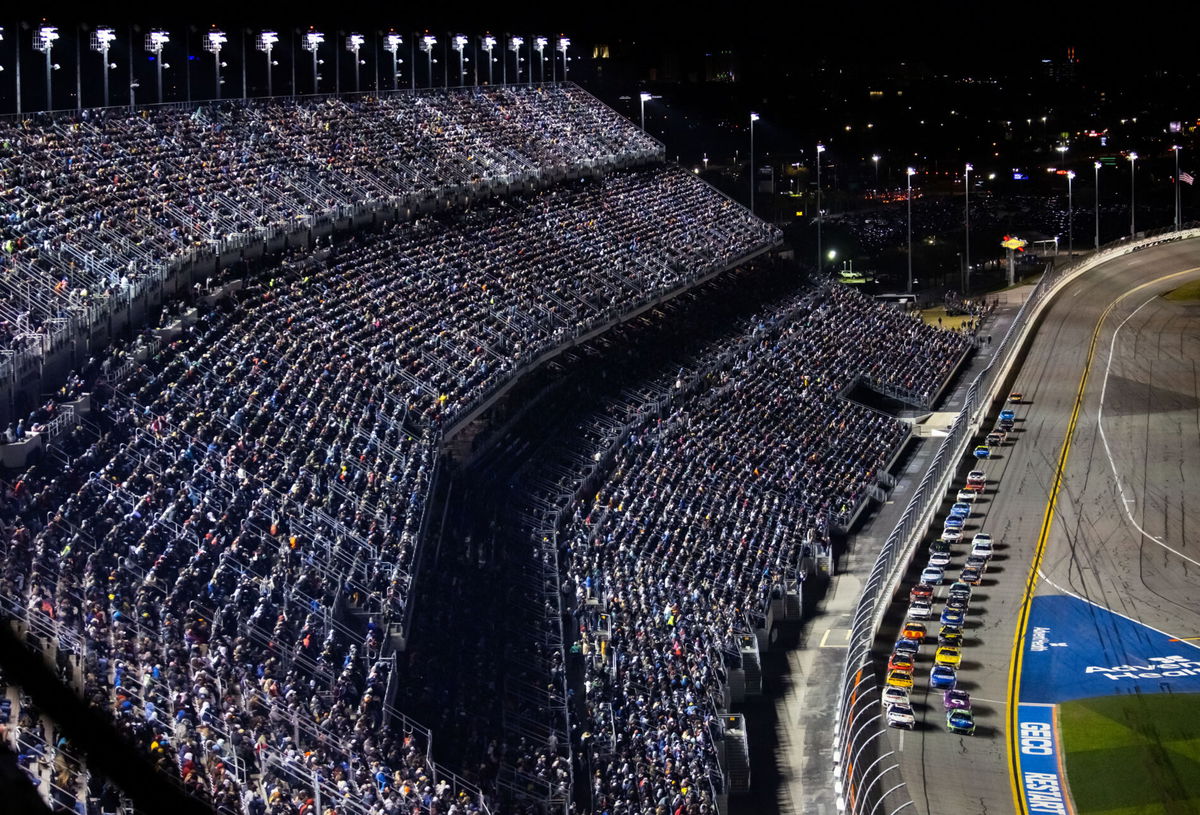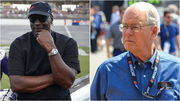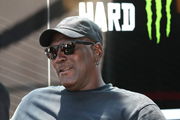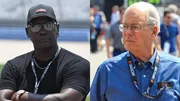
USA Today via Reuters
Feb 19, 2024; Daytona Beach, Florida, USA; Overall view of fans in the crowd as NASCAR Cup Series drivers Kyle Busch (8) and Denny Hamlin (11) race side by side for the lead during the Daytona 500 at Daytona International Speedway. Mandatory Credit: Mark J. Rebilas-USA TODAY Sports

USA Today via Reuters
Feb 19, 2024; Daytona Beach, Florida, USA; Overall view of fans in the crowd as NASCAR Cup Series drivers Kyle Busch (8) and Denny Hamlin (11) race side by side for the lead during the Daytona 500 at Daytona International Speedway. Mandatory Credit: Mark J. Rebilas-USA TODAY Sports
The Daytona 500 has long been the crown jewel of NASCAR, a race that epitomizes speed, strategy, and spectacle. But as the 2025 edition looms, the buzz among fans isn’t just about who will hoist the Harley J. Earl Trophy. It’s about whether the “Great American Race” is losing its shine.
Watch What’s Trending Now!
From fuel-mileage finishes to orchestrated alliances on the track, many fans feel the excitement that once defined the event is being replaced by frustration. Adding to this storm is Brett Griffin, one of the sport’s most outspoken voices, who recently unleashed a fiery critique of the 500 and NASCAR’s current state.
ADVERTISEMENT
Brett Griffin’s explosive rant: “We have a major problem”
Brett Griffin has never been one to sugarcoat his opinions, and his latest tirade is no exception. Just days before the Daytona 500, the NASCAR spotter took to Twitter to air his grievances, sparking a debate that has dominated the motorsports conversation.
“It’s a fuel savings race—imagine all these football games played today at 60-70% until 5 mins to go in the game,” Griffin tweeted. “We have a MAJOR problem. OEM alliances, team orders, daddy’s money creeping into Cup. Houston; we have a problem. And the tires are too hard. And we have no motor. Should I stop?”
Griffin’s comparison of the race to a football game played at half-speed resonated with fans who have grown disenchanted with the strategic, often predictable nature of superspeedway racing. Instead of the all-out battles that made Daytona famous, many feel the 500 has devolved into a calculated chess match dominated by fuel-saving tactics and manufacturer alliances.
ADVERTISEMENT
It’s a fuel savings race – imagine all these football games played today at 60-70% until 5 mins to go in the game. We have a MAJOR problem.
OEM alliances, team orders, daddy’s money creeping into Cup. houston; we have a problem. And the tires are too hard. And we have no motor.… https://t.co/hZ5kTRHYSn
— Brett Griffin (@SpotterBrett) November 30, 2024
For those new to the sport, alliances among manufacturers—Chevrolet, Ford, and Toyota—can be puzzling. Why would rival teams work together? As one fan explained, “The draft is so crucial you need strength in numbers. Even the big four-car teams wouldn’t be able to outrace all the Toyotas locked together.”
ADVERTISEMENT
Griffin’s gripe about “OEM alliances” is rooted in the fact that these partnerships can overshadow the individuality of drivers and teams. Instead of every man for himself, the race often feels like a battle between conglomerates. This was seen in the Martinsville 2024 race where Chevrolet duo Austin Dillon and Ross Chastain ran a blockade for William Byron to prevent him from losing a spot and missing out on the Championship 4. The teams were fined $100,000 each and crew chiefs were suspended for Phoenix following an investigation.
But Griffin didn’t stop there. His critique extended to the tires and engines, areas where he believes NASCAR has sacrificed excitement for reliability. “The tires are too hard,” he wrote, referring to Goodyear’s durable designs that minimize wear but reduce the on-track drama of differing strategies.
Top Stories
What Settlement Agreement Have Michael Jordan & NASCAR Reached? Everything to Know From Evergreen Charters to Payout

NASCAR Flexes Authority With Drastic ‘Sign or Sell’ Charter Clause Hours After $365M Lawsuit Settlement

Michael Jordan Makes 8-Word Statement After Forcing NASCAR to Lawsuit Settlement

Michael Jordan Brings NASCAR to Its Knees as Jim France’s Courtroom Collapse Triggers Settlement

Jordan Fish Pens Heartfelt Message for Fiancé Denny Hamlin After Dramatic Courtroom Settlement With NASCAR

ADVERTISEMENT
NASCAR fans’ reactions: Frustration and fatigue
Griffin’s blunt assessment has struck a chord with NASCAR fans, many of whom have expressed similar concerns about the Daytona 500 and the sport at large. One fan summed up the growing discontent perfectly: “Telling fans we NEED the Playoffs for the viewership when we have less than 20% the early 2000’s had… Yes, some regression was going to occur with streaming services gaining ground, but lauding 1% increases yearly is laughable and offensive.”
Another echoed Griffin’s sentiments about fuel mileage, tweeting, “Don’t get me wrong, I’m a fan of stage racing, but do you think if we dropped the stages at Daytona and Talladega it would fix the problem with fuel saving anyway? I don’t think there’s any hope in the team orders department.”
Even newer fans have questions about the structure of superspeedway racing. “Why are there alliances among manufacturers? I don’t understand why all the Chevies, Fords, and Toyotas would agree to pit together or draft together if they’re not on the same team,” one posted on Reddit.
ADVERTISEMENT
The answer lies in the unique nature of Daytona and Talladega, where the draft creates an environment where strength in numbers often trumps individual strategy. Yet, this dynamic leaves many fans yearning for the days when the best driver, not the best alliance, won the race.
Griffin’s sarcasm was also on full display when a fan criticized NASCAR for focusing on uniforms instead of addressing fundamental issues. “Blank card and non-branded firesuits will def save us,” he quipped, highlighting what many see as misplaced priorities by the sanctioning body.
But it’s not just the on-track product drawing criticism. The way the Daytona 500—and NASCAR races in general—are presented on TV is another sore spot. Fans have long complained about the number of commercials during FOX’s coverage, with some feeling like they’re watching ads more than the race itself.
ADVERTISEMENT
“To be fair, it looks better on TV this way. The actual racing sucks,” one fan remarked, a damning critique that underscores how perception and reality can be at odds in NASCAR’s showcase event.
Griffin’s fiery critique is more than just a rant; it’s a wake-up call. The Daytona 500 is a race steeped in tradition and history, but if NASCAR wants to keep its flagship event relevant in a changing sports landscape, it needs to listen to its loudest—and most passionate—critics.
For fans and insiders alike, the question is no longer just who will win the Daytona 500. It’s whether the race will live up to its storied reputation—or fall victim to its “major problems.”
ADVERTISEMENT
ADVERTISEMENT
ADVERTISEMENT
ADVERTISEMENT

